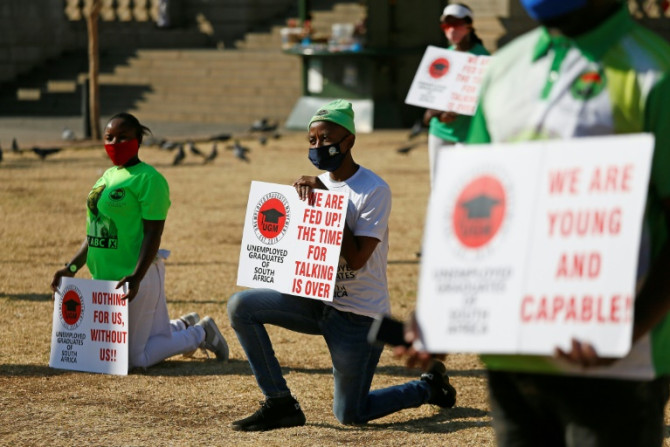Ghana signed a $3 billion bailout deal with the International Monetary Fund on Tuesday in a bid to shore up public finances, but economic stability is still a way off.
Ghana's determination not to seek the fund's help for a 17th time crumbled in July after soaring inflation spurred widespread street protests.
Wheat, corn and palm oil futures have from dropped from record or multi-year highs but prices in the retail market remain elevated and tight supplies are forecast to support prices in 2023.
The IMF said Ghana's government had committed to "a wide-ranging economic reform program" that will restore stability and debt sustainability.
Some groups representing financials institutions that hold Ghana's debt have raised concerns that the restructuring as presented by the finance ministry would not work.
Gross domestic product (GDP) expanded by 1.6 percent in the three months to September, following a 0.7 dip in the previous trimester, StatsSA said.
Like other smaller, riskier emerging market countries including Sri Lanka and Zambia, Ghana faces a debt overhaul after its already strained finances buckled under the economic fallout from COVID-19 and Russia's invasion of Ukraine.
Pazarbasioglu welcomed China's participation in a debt treatment package for Chad, the first country to complete the process under the Common Framework set up in late 2020 by the Group of 20 major economies.
Illegal mining is thriving in South Africa owing to the high unemployment rate, rising operational costs, and dwarfing supply.
IMF Managing Director Kristalina Georgieva, speaking after a meeting with German Chancellor Olaf Scholz, said globalization was facing its biggest challenge since World War Two in the wake of the COVID-19 pandemic and Russia's war in Ukraine.
Reynders, who met with Twitter representatives at the social media platform's European headquarters in Dublin, sought clarifications from the company, a European Commission official told Reuters.
A majority of economists polled in the last week, 12 of 20, predicted another 75 basis point lift, as the bank did in September. Seven expected a half-point move while one expected a full percent.
The Zambian government told investors in October that it hoped to agree debt relief terms with official creditors by the end of this year or early 2023.
South Africa and Tanzania are home to untouched fields which are earmarked for development.
Conservative Prime Minister Rishi Sunak, who took office just three weeks ago, has vowed to fix the economic havoc created by his short-lived predecessor Liz Truss.
Crime syndicates have crippled the public sector in South Africa.
Germany's 10-year yield was up 4.5 basis points at 2.051% after dropping 17.5 bps on Thursday, its joint-largest one-day drop since Oct. 3.
Signs of weakness are emerging from across the economy: exports fell; inflation slowed; new bank lending tumbled.
Exports fell unexpectedly in October for the first time since May 2020, and signs are grim for the November-December period when demand normally peaks as overseas clients place orders before China's factories close for Lunar New Year holidays in January or February.
Kenya's government is reducing its rate of borrowing, officials said on Thursday, to attain a significantly narrower budget deficit in the next financial year.
Before the floods, the West and Central Africa region was already facing a bleak food security situation, said Sib Ollo of the World Food Programme.
The latest inflation readings in the region ranged from nearly 16% in Romania to just over 20% in Hungary, way above central bank target bands ranging from 1% to 4%.
The bleak October trade figures highlight the challenge for policymakers in China as exports had been one of the few bright spots for the struggling economy .
The financial market turmoil caused by Britain's now-abandoned tax-cut plan, still-high inflation and rising interest rates are reasons for Canada to be very cautious about adding stimulus, analysts said last month.
Climate change will cost between six percent and 30 percent of GDP by 2050 in Nigeria, Africa's largest economy, according to experts.
The downgrade also affects banking sectors in the Czech Republic, Hungary, Poland and Slovakia, and Moody's said the grouping includes those most at risk of energy price inflation and possible energy rationing.
Energy-intensive industries, such as aluminium, fertilisers, and chemicals are at risk of companies permanently shifting production to locations where cheap energy abounds, such as the United States.
The country emerged from a decade-long debt crisis in 2018 and since then has relied solely on bond markets to cover its borrowing needs.
It said in a statement that in its assessment it had focussed on banks' exposure to river and surface water flood risk in the Auckland region.
The Resolution Foundation estimated that tax rises and spending cuts of at least 30 billion pounds would be needed to ensure debt was falling as a share of gross domestic product by the 2026-27 financial year.











































